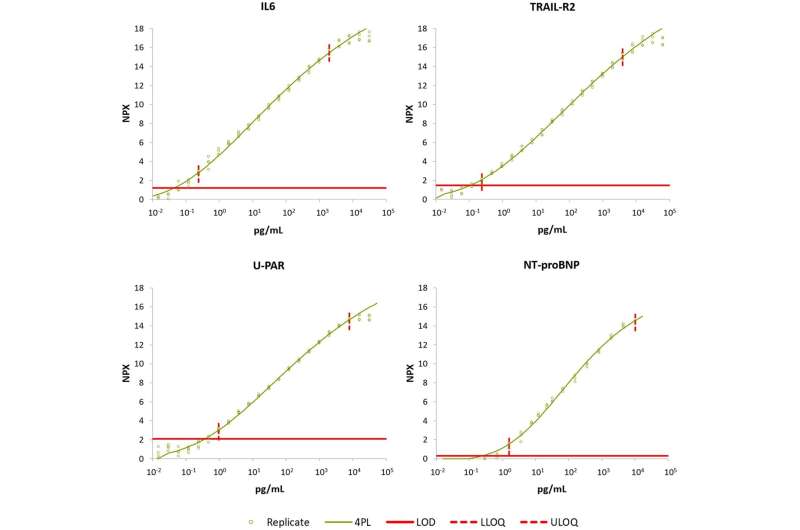This article has been reviewed according to Science X's editorial process and policies. Editors have highlighted the following attributes while ensuring the content's credibility:
fact-checked
peer-reviewed publication
trusted source
proofread
New tool for precision medicine in cardiovascular disease

Researchers at Uppsala University have developed a tool that makes it possible to measure 21 biomarkers for cardiovascular disease simultaneously with great precision by means of a simple blood test. The aim is to use this type of tool to improve the prediction of cardiovascular complications and facilitate more personalized treatment for patients. It will also make it easier to monitor the effects of treatment. The study has been published in the journal PLOS One.
The instrument now developed is based on analyses of 368 proteins in blood. The samples come from more than 10,000 patients who have participated in international studies of new ways of treating cardiovascular disease and atrial fibrillation.
As a result of their analyses, the researchers have identified 21 circulating proteins (CVD-21 panel) that can be used as biomarkers. All these biomarkers reflect functional disturbances that influence the development of cardiovascular disease as well as the benefits and risks associated with different treatments.
The CVD-21 instrument measures protein contents down to very low concentrations using molecular biology technology known as Proximity Extension Assay (PEA), which has been developed by researchers in Uppsala. Moreover, a very small volume of blood plasma is required for the analysis.
The information from the CVD-21 instrument has been evaluated using blood samples and clinical information from 4,224 patients with chronic coronary disease.
With regard to the results of risk assessment for all types of cardiovascular complications, CVD-21 combined with the protein troponin T was comparable with a model using a couple of previously known risk markers for cardiovascular disease. In addition, via the instrument, the researchers identified nine new biomarkers with predictive significance for various cardiovascular complications, such as myocardial infarction, cardiovascular death and hospitalization for heart failure.
These biomarkers reflect a range of disease processes and can all contribute to increased knowledge of the underlying causes of cardiovascular disease. Biomarker-based risk assessment also proved to outperform risk assessment using only clinical variables, which is the method primarily used in current routine clinical care.
"Our biomarker-based instrument provides information about many proteins with known or unknown functions at the same time and has been developed for research and future application in care for cardiovascular diseases.
"Our study shows that concentrations of biomarkers can reveal various signatures associated with heart complications. The development of CVD-21 is a first step that involves simultaneously quantifying many cardiovascular processes in a single drop of blood," says Agneta Siegbahn, Professor of Clinical Coagulation Science at Uppsala University.
In the future, instruments such as CVD-21 could play an important role in supporting decisions in cases of cardiovascular disease as well as various other diseases. For example, based on selected biomarkers, patients with cardiovascular disease could be divided into more specific sub-categories than we have at present, which would pave the way for more customized treatment strategies.
More information: Agneta Siegbahn et al, Development and validation of a quantitative Proximity Extension Assay instrument with 21 proteins associated with cardiovascular risk (CVD-21), PLOS ONE (2023). DOI: 10.1371/journal.pone.0293465



















